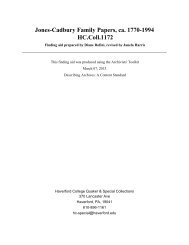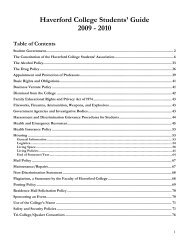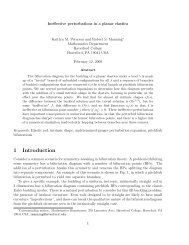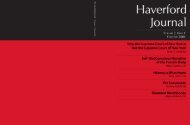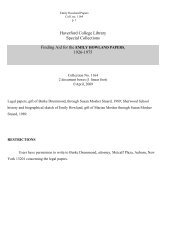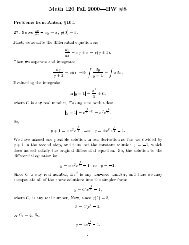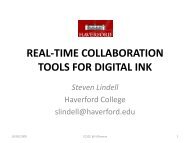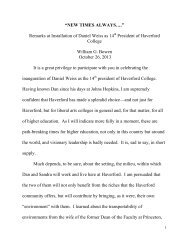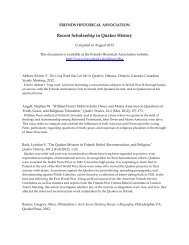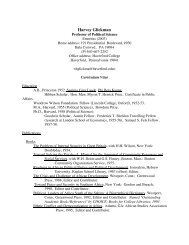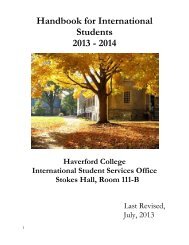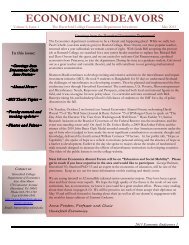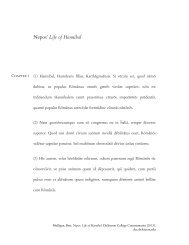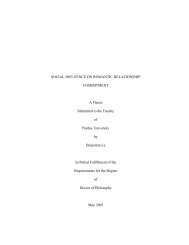Spring 2002 - Haverford College
Spring 2002 - Haverford College
Spring 2002 - Haverford College
Create successful ePaper yourself
Turn your PDF publications into a flip-book with our unique Google optimized e-Paper software.
Faculty Profile<br />
strategies while co-authoring a book with<br />
Charles Euchner, Executive Director of<br />
the Rappaport Institute for Greater Boston<br />
at Harvard’s John F. Kennedy School of<br />
Government. Called To Make the City<br />
Whole: Dialogues on the Problems and<br />
Prospects of Urban America, the book will<br />
give an overview of past and present urban<br />
policy in the areas of economic development,<br />
poverty and welfare, housing and<br />
community development, education, and<br />
crime, and recommend policy proposals<br />
and revitalization strategies for the future.<br />
The class encourages<br />
students to make an<br />
attempt to see the political<br />
world through the eyes<br />
of these groups.<br />
“The number one policy priority, in my<br />
view, ought to be education,” he says, and<br />
uses the case of Philadelphia in the ’90s<br />
to illustrate his point. “In the 1990s<br />
Philadelphia had a very popular mayor,<br />
who was reelected by a lopsided margin<br />
for a second term, yet the city lost more<br />
residents than any other city in the country<br />
during this decade, largely due to its<br />
substandard public schools.” The core<br />
problem, he says, is that city schools are<br />
underfunded, with fewer resources than<br />
their suburban counterparts. “The textbooks<br />
are sometimes more than 20 years<br />
old, classes are far too large, and there are<br />
a lot of physical problems. In an urban<br />
school on a rainy day, you can count the<br />
number of puddles inside in the hallway.”<br />
Next year, when McGovern is on leave,<br />
he plans to take a closer look at<br />
Philadelphia by beginning a new research<br />
project centered on two aspects of the<br />
city’s redevelopment: its waterfront refurbishing<br />
(and the extent to which citizens<br />
are involved in the planning process) and<br />
Mayor John Street’s Neighborhood<br />
Transformation Initiative (NTI). Budgeted<br />
at more than $250 million, the NTI aims<br />
to demolish 14,000 decaying structures<br />
and assemble large tracts of land in distressed<br />
neighborhoods beyond Center<br />
City for new market-rate housing. “This is<br />
a bold move,” says McGovern, “and it raises<br />
all kinds of questions: How will it disrupt<br />
neighborhoods? Will lower-income<br />
residents benefit?”<br />
McGovern, who normally hires at least<br />
one student as a research assistant per<br />
year, wants to involve his students even<br />
more deeply in this new project, bringing<br />
them into the field to conduct interviews<br />
and gather data. In the meantime, he continues<br />
to offer them an alternate perspective<br />
on the American political scene by<br />
teaching a course in politics as seen from<br />
the point of view of marginalized groups,<br />
such as people of color, women, gays and<br />
lesbians and the poor. “It encourages students<br />
to make an attempt to see the political<br />
world through the eyes of these<br />
groups,” he says, although he has noticed<br />
that most Fords are already inclined to do<br />
so even before they arrive on campus.<br />
“One of the unique things about<br />
<strong>Haverford</strong> is its long tradition of supporting<br />
social justices causes,” he says.<br />
“This sets it apart from other small liberal<br />
arts colleges.”<br />
Outside of his teaching and research,<br />
McGovern spends quality time with his<br />
wife of 11 years, Lisa Baglione, an associate<br />
professor of political science at St.<br />
Joseph’s University in Philadelphia who<br />
specializes in international relations and<br />
Russian politics, and his two children,<br />
three-year-old Jack and one-year-old<br />
Maria. It’s not unusual to see Jack and<br />
Maria strolling around campus with their<br />
mother and father and greeting their many<br />
fans in the <strong>Haverford</strong> community, or playing<br />
in the sandbox outside of the Hall<br />
Building on nice days. When they leave<br />
campus, the family sometimes goes to<br />
Philadelphia to explore neighborhoods<br />
and new development sites. “Jack is a big<br />
fan of large construction sites,” says his<br />
proud father, “especially if there are any<br />
mobile cranes around.”<br />
McGovern has still another vision for<br />
the future that would bring students from<br />
<strong>Haverford</strong> and Bryn Mawr full force into<br />
the midst of his research: an urban center,<br />
located in Philadelphia, that would<br />
allow participants to live and study in the<br />
city and work as interns in local government<br />
offices and nonprofit organizations.<br />
“It would expose them to urban life firsthand,”<br />
says McGovern, “and I think they’d<br />
love it.” And, with any luck, they’ll follow<br />
in the footsteps of their professor,<br />
searching for ways to make cities whole<br />
once again.<br />
Steve McGovern currently teaches the<br />
following classes in political science:<br />
American Politics: Difference and<br />
Discrimination—An introduction to<br />
American politics through the<br />
perspective of individuals who<br />
have experienced discrimination<br />
Mobilization Politics—Explores<br />
how ordinary citizens have sought to<br />
advance their interests outside the<br />
normal institutions of politics and<br />
government<br />
Social Movement Theory—A theoretical<br />
analysis of origins and development<br />
of mass-based protest movements in<br />
the U.S.<br />
Urban Politics—Examines power and<br />
politics at the local level of government,<br />
particularly of large American cities<br />
Urban Policy—An analysis of public<br />
policies aimed at revitalizing U.S. cities<br />
following several decades of suburbanization<br />
and capital disinvestments<br />
McGovern’s most recent publications include:<br />
The Politics of Downtown Development:<br />
Dynamic Political Cultures in San Francisco<br />
and Washington, D.C. (University Press of<br />
Kentucky, 1998); “Cultural Hegemony as<br />
an Impediment to Urban Protest<br />
Movements: Grassroots Activism and<br />
Downtown Development in Washington,<br />
D.C.,” Journal of Urban Affairs, vol. 19,<br />
no. 4, December 1997; “Political Culture<br />
as a Catalyst for Political Change in<br />
American Cities: An Analysis of<br />
Competing Models,” Critical Sociology,<br />
vol. 23, no. 1, November 1997; and<br />
“Mayoral Leadership and Economic<br />
Development Policy: The Case of Ed<br />
Rendell's Philadelphia,” Policy and<br />
Politics, vol. 25, no. 2, April 1997. He has<br />
presented several of his papers at leading<br />
academic conferences, among them<br />
“Ideology, Consciousness, and Inner-City<br />
Redevelopment: The Case of Stephen<br />
Goldsmith’s Indianapolis,” at the Ninth<br />
National Conference on American<br />
Planning History, Philadelphia/Camden,<br />
November 2001; and “Revitalizing the<br />
City: New Strategies from a Republican<br />
Mayor,” at the Northeast Political Science<br />
Association, Annual Meeting,<br />
Philadelphia, November 1997.<br />
14 <strong>Haverford</strong> Magazine



